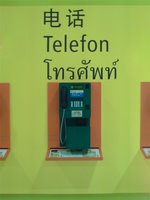"Dream of the Lotus Pond" is one of a kind in Gezi opera genre, or at very least in mainland China, as this production was not staged in a typical proscenium setting, but in a traverse stage. Staged in Xiamen Cultural Centre's Xianfeng Theatre, the actors had to enter and leave stage through the audience seating area. Surprisingly, the audience seemed to be able to accept this relatively unconventional way of Chinese opera presentation rather well, and members of the audience gave positive feedbacks like "very intimate" and "very direct". In fact, it seems that this form of presentation is very suitable for this production, since this show is not about narrating a story, but more of telling a moral. Unfortunately I'm unable to tell more about the plot as I can't seemed to find a synopsis or summary of the plot off the net. Luckily though, I found quite a number of rather well-taken photographs of the show in action. So sit back, and enjoy!












2 comments:
I just found this website and am fascinated by this troupe! Is there any more information available in English? What are the ideographs for Gezi Opera, in case Chinese websites have more information that the magic of Google Translate can help me decipher?
I'm glad you liked what I wrote! From what I understand, the general plot is about a young man who tried to find out the mystery of his father's death years back and in the process of doing so, the hidden faces of every family member within the household surfaced (hence why the choice of a traverse stage, I supposed). The characters for Gezi Opera is 歌仔戏 in simplified Chinese, and 歌仔戲 in traditional Chinese. Anyway, there's another name for this form of opera called Xiangju (芗剧 in simplified Chinese and 薌劇 in traditional Chinese) which is the more "official" name to this genre in mainland China.
Post a Comment